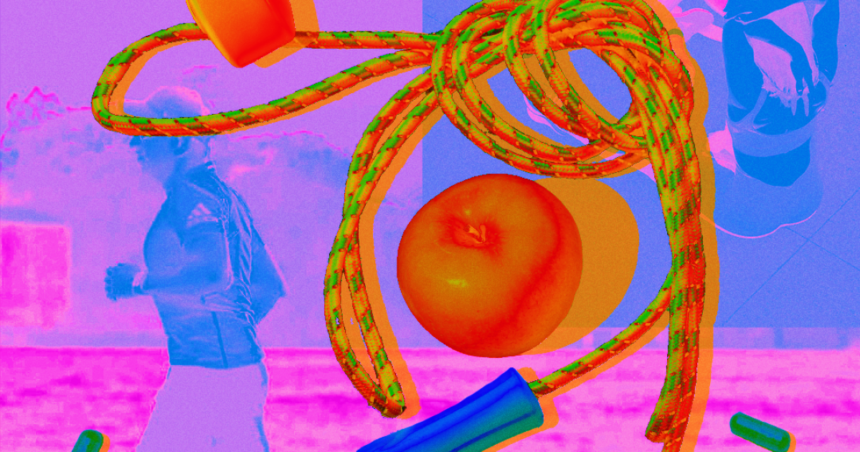It wasn’t too far into December that my Instagram feed suddenly was heavy with weight loss ads and posts. They’ve always been there, what with being a woman and our phones noting every Google search or anything we may mention in what we think is the privacy of our own home or group chat.
Still, I was suddenly inundated with sponsored and suggested posts for meal planning kits, various dieting apps, supplements promising to empty my guts of poop and bloat, and a workout system that focuses on releasing trauma from the body that’s preventing weight loss.
And here I thought healing trauma was in itself worthwhile work. I had no idea getting rid of bread back was a factor I should also consider in my healing journey.
The algorithm works hard, but it echoes loudly beyond the confines of our phones tripling its reach, showing up in more familiar, and therefore more painful, places — your mom giving you diet pills from who knows where, a friend who is thinner than you saying negative things about their body and weight, a partner squeezing your lonja; really the triggers can come from anywhere.
As the new year approaches, and with it the potential of becoming the version of yourself that will make you the happiest, healthiest and most fulfilled, it leaves many people, especially women, vulnerable to disordered eating and compulsive exercise.
Diet culture and body shaming go into overdrive, and it puts Latines at greater risk of disordered eating, especially when as a community, binge eating and obesity are already prevalent.
But creating new, healthy eating habits can be tough when so much of our food is stigmatized as bad.
Dalina Soto is a registered dietitian, licensed dietary nutritionist, and the founder and CEO of Nutritiously Yours and Your Latina Nutritionist, which focuses on educating and treating members of the Latino community on diet, health and chronic disease management in a way that values and honors our cultural cuisine.
She says that assimilation into American culture can be one reason Latines are at a high risk for eating disorders.
“Because our ‘cultural’ foods do not fit the American mold, many try to change their habits to fit these ‘diets’ and it’s a slippery slope,” explained Soto, who has been a dietitian for 10 years. “Western Americanized diets erase our flavors and ingredients. The people creating the guidelines have never stepped foot in our countries and have no idea how our dishes are cooked. And the medical and nutrition fields are riddled with stereotypes and racism against us.”
And it’s true, food like tortillas and rice have been disparaged and given a bad rap for being delicious little blankets we fill with warm, savory delicacies just because they’re a carb. To be a carb is a crime within dieting culture, and it’s truly heartbreaking to see.
I grew up hearing my mom, tías, sisters, dad, etc. all lament having to forego tortillas when they were trying to lose weight, or announcing that they only had one tortilla with their last meal, their face forcing pride I knew they didn’t feel. Inevitably, they relapsed hard at the cenaduría, indulging in mounds of crispy, golden flautas with guilt-ridden abandon, bingeing hard after a harsh period of restriction.
Rice, too, has been given the villain edit. I recall my mom once sadly sitting on the couch in the throes of diet depression looking over to me and saying “No me importa que no puede comer pasta, pero no comer arroz me duele el alma.”
But it doesn’t have to be this way.
“That’s really central to what we do,” said Isabel Vasquez, a registered dietitian and licensed dietary nutritionist at Your Latina Nutritionist. “Empowering Latinos to ditch diets, make peace with food, and work towards their health in a way that’s authentic to them. Rather than focusing on restricting foods, restricting their cultural foods and not having to buy into these very rigid rules that diet culture promotes.”
Years back, I came across “Decolonize Your Diet: Plant-Based Mexican-American Recipes for Health and Healing,” a cookbook by Luz Calvo and Catriona Rueda Esquibel. After speaking with them, and cooking their recipes for a week, I learned to rid myself of the notion that tortillas are bad. Rice is bad. The food I grew up with is bad. It was just a matter of approaching it differently.
Our cultural cuisine is rich in vegetables, fruit is in abundance and grains are integral to almost every meal. That goes for all Latin American countries. It doesn’t help that media so often echoes that notion. How often is Mexican food painted as diarrhea-inducing, deep-fried slop?
Sorry, if your tummy can’t handle beans, babe. You’re just not God’s favorite.
Vasquez and Soto note the lack of research in both the health properties of Latin cuisines as well as the real risks of disordered eating within Latine communities, and the harm that it causes especially when our doctors and other healthcare providers regurgitate information rooted in medical racism.
Diet culture is bad, but it’s especially harsh against Black and Latinx people who are already targeted by racist BMI standards.
That our own families and community can buy into the stigmas that our food is unhealthy sets people up for failure when they are trying to change their diet, their lives and their overall health.
“Because EDs [eating disorders] are usually seen as a thin white woman disease, not just Latines but all people of color are overlooked in research,” added Soto. “We know that negative body image, depression, sexual assault, ethnic discrimination and acculturative stress add to the risk.”
“Research and funding go a lot into things like the Mediterranean diet, which is approached from a very white, Eurocentric lens, rather than funding research into other cultural cuisines,“ said Vasquez. ”It’s not that research shows they’re bad. It’s just that there isn’t research on them and that should change.”
As we begin 2024 and set off to make lifestyle choices to improve overall health, let’s be mindful of nourishment over restriction, and embrace the foods of our cultures.
Tortillas are not your enemy.
Alex Zaragoza is a television writer and journalist covering culture and identity. Her work has appeared in Vice, NPR, O magazine and Rolling Stone. She’s written on the series “Primo” and “Lopez v. Lopez.” She writes weekly for De Los.











